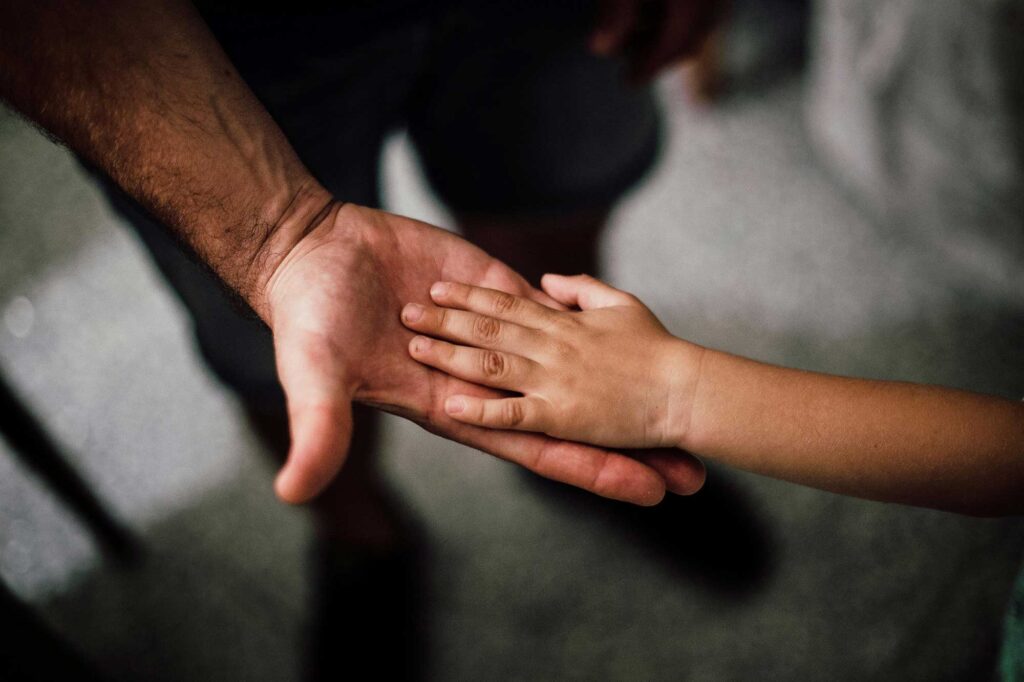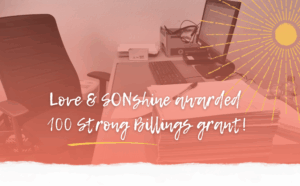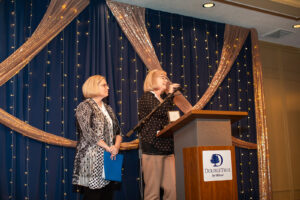When Tabitha and I first said yes to teaching Fatherhood is Sacred, Motherhood is Sacred, something stirred deep in me. I had been through a lot of parenting programs before, but this one felt different from the start. It grabbed hold of my identity as a Northern Cheyenne man. Living in Billings, I don’t always get to experience the richness of my culture. This curriculum gave me back a piece of myself—my history, my stories, my people. Even my wife learned things about me, my culture, and my history that she didn’t know before.
But beyond that personal connection, the program teaches differently. It doesn’t hand you a slide deck full of bullet points and techniques. It teaches through story. Through relationship. Through connection. That’s why it sticks. And its foundation—self-worth, identity, and purpose—are pillars that every one of us needs. Once you begin to discover who you are, why you matter, and what you were created to do, you become unstoppable. You begin to live the life you were designed for.
How My “Why” Has Grown
At first, my gut told me this program was special. But once we started teaching it—watching men and women open their hearts, face their past, and see themselves differently—I knew for sure. I’ll never forget that first class at Adult & Teen Challenge here in Billings. The conversations were raw, vulnerable, and full of life. People said things like, “This is the best part of my week.” That’s when I realized this was more than a curriculum. It was a lifeline.
One man in particular stands out. He was older than me, with twelve children. He told me, “Josh, I have 12 kids and I’ve never been a father to any of them. But I see now—it’s not too late. I’m choosing to be a father.” Weeks later, he started getting calls from his kids. He began building relationships for the first time in his life. At 50 years old, he was stepping into fatherhood. That’s the power of this program. It’s never too late.
What “Sacred” Really Means
The word sacred is central here. To me, sacred means holy, set apart, deeply valued. Parenting isn’t just another responsibility—it’s the most important one. Our world often treats parenting as optional, something to hand off to schools or daycares, but this program says otherwise. It reminds us: your children need you. No matter what you’ve thought, or what they’ve said, they need you in their lives.
And sacred doesn’t stop with family. Community itself is sacred. Without it, we end up isolated, echoing only our own voices. Sacred community means creating a place where we can share struggles, grow together, and thrive.
Sacred Suppers
That’s why we added Sacred Suppers. For Native people, gathering around a meal is how community is built. Growing up, my own family table was where memories were made—where we laughed, cried, shared stories, and grew closer. We wanted our classes to reflect that same sacred space.
One night we shared hamburger soup and fry bread—a staple meal many of us grew up with. As soon as the smell filled the room, people lit up. It brought back childhood memories. Someone would say, “This is how my mom made it,” and someone else would say, “Well, my family’s fry bread was the best.” Laughter filled the room. That simple meal carried memory, culture, and connection.
Eating together breaks down walls. Some participants come in guarded, court-ordered, unsure of what they’re walking into. But a shared meal softens hearts. It builds trust. It gives us a reason to sit side by side and share stories. Even if someone came just for the food, they stay for the relationships—and for the wisdom that starts to take root.
Building Leaders
One of the things I love most about this program is how it shapes leaders. It reminds us that fatherhood is leadership. Motherhood is leadership. Even single parents, when they begin to lead their homes with purpose, set an example for others. Leadership isn’t about titles—it’s about choices and actions.
Tabitha and I see ourselves not just as teachers, but as mentors raising up other teachers. Because the truth is, this program is bigger than the two of us. As we expand, we’re bringing new leaders into the classroom, letting them step up and find their voice as facilitators. The goal is multiplication—building a model here in Billings that others can take into sober livings, treatment courts, churches, and beyond. Already, those seeds are sprouting.
The Challenges
Of course, it hasn’t all been easy. One of the hardest barriers is funding. Because this is Native-centered programming, it doesn’t have the “evidence-based” stamp that state and federal funders often require. That creates challenges. Yet we’ve seen foundations and donors step up to help cover meals, childcare, and materials.
Another barrier has been perception. As Tabitha puts it, sometimes people hear “Native American program” and assume it’s not for them. But once they open their minds and hearts, they see it’s for everyone. And when they do, the change in their lives is undeniable.
Still, the beauty of the program outweighs the barriers. With every challenge—whether it’s funding, childcare, or cultural misunderstanding—we’ve seen God open doors.
God’s Hand
God has been at the center of all of this. Creator is the very first principle of the program. And that resonates deeply, not just with Native people but with all people. Across tribes and generations, we’ve always known we were created for more, that prayer matters, that there is life beyond this one. Teaching this class has given us space to have those conversations—sometimes right in the classroom, other times later over coffee.
There was even a time early on when I thought the whole thing was going to fall apart. A grant fell through, and with it, the chance to teach. But that’s when Love and SONshine Ministries stepped in. Heather and Heidi, our founders, saw the value and said, “We’ll do this. Let’s make it happen here.” Looking back, I see God’s hand all over that. What felt like a closed door was really a setup for something bigger.
The Bigger Picture
Now, FIS/MIS is a natural fit with Love and SONshine’s vision. Education and life skill development is one of the pillars of our ministry, and this program extends that arm into the wider community. It speaks directly into the struggles we see every day—addiction, poverty, family cycles that feel unbreakable.
As Al Pooley, the program’s founder, reminds us: we are not broken. We’ve just been misled, misguided, and misinformed. That truth, confirmed even in clinical research, reshapes how people see themselves. And it’s why this program speaks so powerfully to Native communities and to families healing from trauma in Billings.
Looking ahead, I see this program becoming permanent in treatment courts, health centers, sober livings, and ministries across Montana. I see it growing into Bozeman, Missoula, and our reservations. And I see it creating full-circle opportunities—not just for healing, but for leadership and economic empowerment. Just look at Jennifer Myers, our extraordinary cook, who has turned her challenges into triumph. Now a thriving business owner, she prepares culturally rooted meals that bring people together, while mentoring other women with her strength and wisdom. Her story is a living example of this program’s ripple effect—how resilience, leadership, and community can grow from even the toughest beginnings.
Personal Reflections
For me personally, this program has reminded me of the sacredness of fatherhood. It’s not just a role—it’s leadership, it’s identity, it’s legacy. Saying yes to that responsibility has made me a better man, father, husband, and leader. My children know I love them, that I’m working for their best, and that I take my role seriously.
Teaching alongside Tabitha has been one of the greatest gifts of my life. We’ve taken the struggles of our past—the things the enemy meant for harm—and turned them into stories of healing and hope. Getting to do that side by side, as best friends and partners, is more than I could have ever asked for.
And if I had to summarize the heart of this program in one line, I’d borrow from Al Pooley himself:
“The family is at the heart of Native American cultures. There is no other work more important than fatherhood and motherhood.”
That is why we do this work. That is why it matters. And that is why we’ll keep teaching, sharing meals, raising up leaders, and building sacred communities—one family at a time.




